Introduction
RTP in casino games plays a central role in how casino games are built and how players experience them. Therefore, it directly influences payout behavior, session duration, emotional pacing, and long term cost of play. Although many players view return to player only as a static percentage, developers treat it as a structural rule embedded deep inside probability models. As a result, understanding RTP in casino games explains why some titles feel balanced while others feel aggressive. It also clarifies how casino game RTP influences player decision making over time.
1. What RTP Represents in Casino Game Systems

Return to Player (RTP) represents the long term expected return of a casino game calculated across an extremely large number of rounds. However, RTP does not describe what happens in short play sessions. Instead, it defines statistical behavior that becomes visible only through volume.
- Long Term Expected Value
RTP defines how much value a game returns on average after millions of bets. As a result, it reflects the long term cost of participation rather than short term outcomes. Therefore, players should use it as a planning reference instead of expecting session level accuracy.
- Independence of Outcomes
Each spin or hand remains mathematically independent from previous results. Consequently, RTP does not rebalance or compensate after losses or wins. In practice, streaks appear because probability clusters naturally over time.
- Foundation for Game Balance
Developers treat RTP as a non negotiable constraint during design. Because of this, every payout, feature trigger, and rule must operate inside that boundary. This keeps gameplay consistent across bet sizes and player behavior.
2. How RTP Is Set During Game Development

Return to Player (RTP) is defined at the earliest stage of game development. Therefore, designers lock this value before any visual design or interface work begins. This ensures creative elements never override mathematical integrity.
- Probability Model Design
Developers create detailed math models that assign weighted probabilities to every possible outcome. As a result, expected value aligns precisely with the target across all bet levels. These models also account for exposure limits and edge cases.
- Simulation and Validation
Millions of simulated rounds test the model under real usage conditions. Consequently, payout imbalance, feature inflation, or return drift surfaces early. This allows correction without risking compliance or trust.
- Configuration Locking
Once validated, RTP related parameters are locked at the configuration layer. Therefore, later updates cannot change return behavior unintentionally. This separation protects certified math from operational changes.
3. Relationship Between RTP, Volatility, and Hit Rate
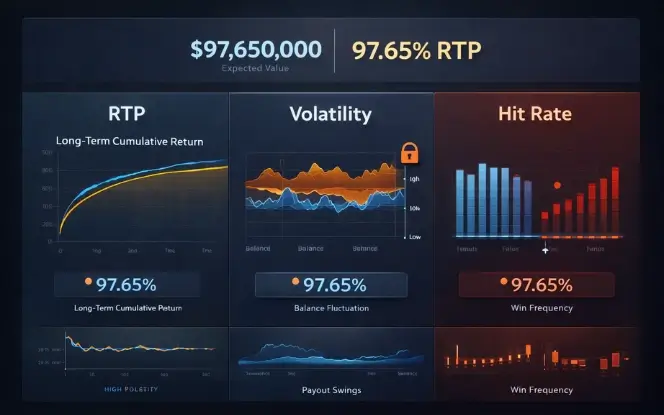
Return to Player (RTP) alone does not determine how a game feels during play. Instead, RTP, volatility, and hit rate interact to shape emotional rhythm and perceived fairness. As a result, games with similar returns can feel very different.
- RTP as Value Volume
RTP defines how much value flows back to players over time. However, it does not describe when or how that value appears. Therefore, it must be evaluated together with volatility and hit frequency.
- Hit Rate as Feedback Frequency
Hit rate controls how often players see any payout, even a small one. Consequently, higher hit rates create momentum and reduce frustration. This strongly influences session comfort. - Volatility as Emotional Range
Volatility determines payout spread and swing intensity. Therefore, high volatility produces sharper highs and longer dry spells. Lower volatility delivers steadier balance movement.
4. Paytables and Symbol Weighting Mechanics
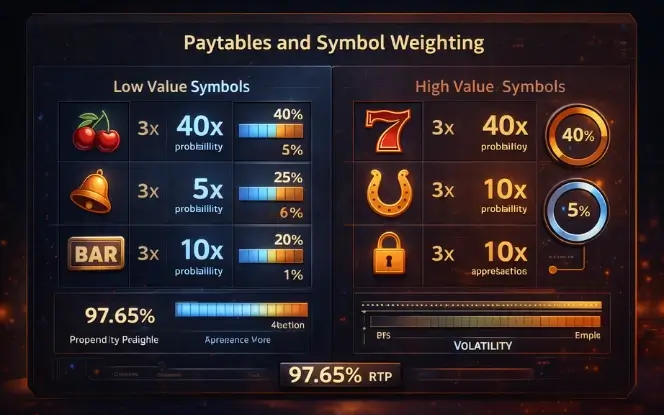
Return to Player (RTP) integrity depends heavily on how paytables and symbol weights are structured. Therefore, designers rely on controlled probability rather than equal chance logic.
- Symbol Weight Assignment
Low value symbols are weighted to appear more frequently. As a result, players experience regular minor wins that sustain engagement. Meanwhile, high value symbols remain rare to protect balance.
- Paytable Construction
Each symbol combination carries a specific payout value. Consequently, expected value remains consistent across all outcomes and bet sizes. Designers adjust these values carefully during testing.
- Outcome Distribution Control
Adjusting symbol weights changes volatility without altering return. Therefore, teams can tune player experience while maintaining certification and fairness.
These mechanics are explored further in casino game mechanics the art of balancing risk and reward.
5. RTP Allocation Across Bonus Features

Return to Player (RTP) applies across the entire game, including all bonus features. Therefore, bonus mechanics redistribute value rather than introduce extra return.
- Base Game Allocation
A portion of RTP supports standard gameplay outside bonuses. As a result, players can maintain sessions without relying on rare features. This stabilizes early engagement.
- Feature Return Allocation
Another portion funds free spins, multipliers, or bonus rounds. Consequently, peak excitement remains controlled and predictable within the model.
- Top End Payout Control
Large wins require strict exposure limits. Therefore, designers cap feature outcomes to prevent return distortion or excessive variance.
This balance is explained further in crafting the perfect casino game balancing luck and strategy.
6. RTP in Table Games and Rule Based Systems
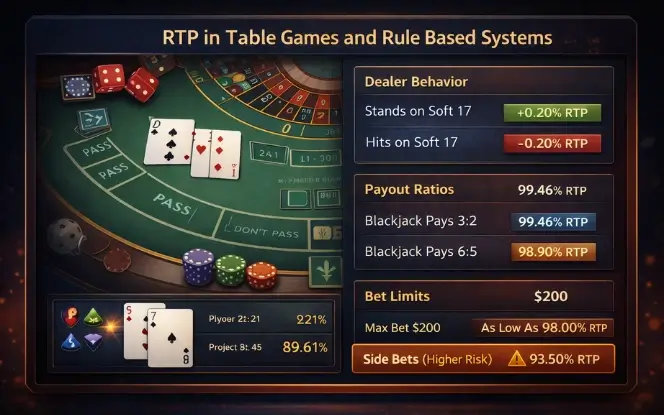
Return to Player (RTP) in table games is driven by rule sets rather than symbol weighting. As a result, small rule changes can significantly affect expected value.
- Rule Driven Outcomes
Dealer behavior, payout ratios, and action limits define return. Therefore, tables with different rules create different long term costs for players.
- Player Decision Impact
Optimal decisions reduce loss rate over time. Consequently, player skill plays a larger role compared to slots. Strategy directly influences results.
- Side Bet Risk
Side bets usually carry lower returns than core wagers. As a result, frequent use increases long term cost without improving base odds.
7. Live Casino Games and RTP Constraints
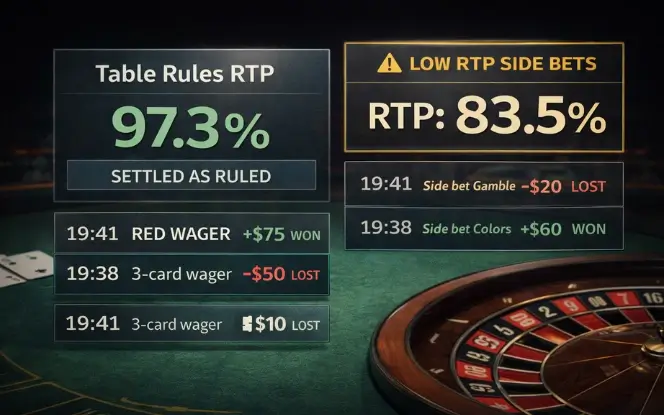
Return to Player (RTP) in live casino games reflects physical outcomes combined with digital settlement. Therefore, accuracy and transparency are essential.
- Real World Outcome Capture
Cards and wheels determine results through live dealing. As a result, return reflects table rules rather than software logic. This makes rule clarity critical.
- System Synchronization
APIs transmit outcomes and settle bets instantly. Consequently, balances and results remain consistent even during high traffic periods.
- Side Bet Exposure
Live formats emphasize side bets with lower returns. Therefore, informed players avoid unnecessary long term cost increases.
8. RTP Influence on Player Strategy and Bankroll Planning
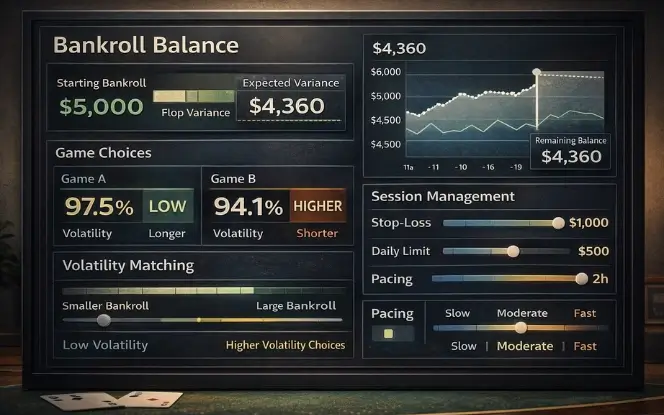
Return to Player (RTP) supports planning rather than prediction. Therefore, players who understand it make calmer and more controlled decisions.
- Game Selection
Higher values reduce long term loss rate. As a result, players can extend sessions without increasing average spend.
- Volatility Matching
Players align volatility with available bankroll size. Consequently, drawdowns remain manageable during normal variance cycles.
- Session Management
Clear understanding encourages limits and pacing. Therefore, emotional reactions decrease and decision quality improves.
For applied context, online casino payouts explained how it works and what to expect offers practical insight.
9. Monitoring RTP After Game Launch
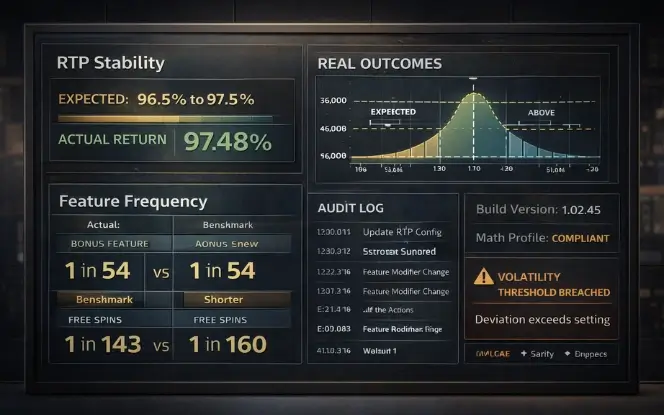
Return to Player (RTP) validation continues after deployment. Therefore, developers and operators monitor live data continuously.
- Distribution Tracking
Outcome patterns are compared against expected statistical ranges. As a result, irregular behavior is detected before affecting many players.
- Feature Frequency Analysis
Bonus trigger rates are monitored against benchmarks. Consequently, unintended shifts caused by logic changes are corrected quickly.
- Configuration Audits
Build versions and math profiles are tracked rigorously. Therefore, unauthorized changes are prevented and compliance is preserved.
10. Why Choose SDLC Corp For RTP Driven Casino Games
Return to Player (RTP) driven game design demands precision, compliance awareness, and real delivery experience. Therefore, choosing the right development partner directly affects long term platform performance and player trust.
- Deep Casino Game Engineering Expertise
SDLC Corp designs and delivers casino products where RTP, volatility, and payout logic are built correctly from day one. As a result, games remain stable, compliant, and scalable across markets through our proven casino game development company services.
- Compliance Ready And Scalable Architectures
RTP logic is implemented with certification and audit requirements in mind. Consequently, platforms reduce approval delays while staying ready for future expansion without reworking core systems.
- End To End Delivery With Ongoing Support
From math modeling to post launch monitoring, SDLC Corp supports the full game lifecycle. Therefore, RTP behavior remains consistent even as traffic, features, and integrations grow.
Conclusion
Return to Player (RTP) shapes casino games from the inside out. Therefore, it guides probability models, feature design, volatility tuning, and compliance workflows. For players, it informs game selection, bankroll planning, and risk control. As a result, understanding RTP separates expectation from chance. Casino game RTP works best when developers design it carefully and explain it clearly.
For expert guidance on compliant game design, probability modeling, or platform engineering, Contact us SDLC Corp to discuss your requirements.
FAQs
What Does Return To Player Mean In Casino Games?
Return to Player shows how much value a game pays back over long term play. Therefore, it helps players understand average cost rather than predict short term results.
How Does RTP Influence Casino Game Design?
RTP guides paytables, bonus logic, and payout limits. As a result, developers balance engagement and risk within fixed mathematical boundaries.
Why Do Games With The Same RTP Feel Different?
Volatility and hit rate vary between games. Consequently, payout timing and emotional pacing change even when RTP stays the same.
How Does RTP Affect Player Strategy?
RTP influences game selection and bankroll planning. Therefore, players use it to reduce long term loss rather than chase short term wins.
Are High RTP Casino Games Always Better?
High RTP lowers long term cost but does not remove variance. As a result, players must still consider volatility and session limits.




